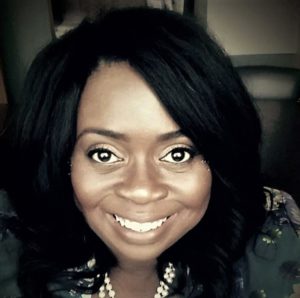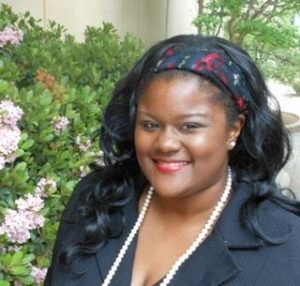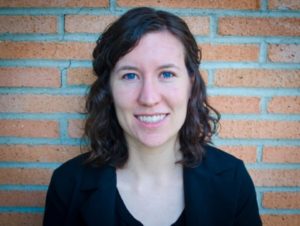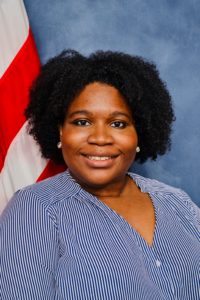CPH grads impact public health through Fellowship assignments at the CDC
February 12, 2018 • Uncategorized
Four UNTHSC College of Public Health graduates are helping to create healthier communities through their work in Fellowship programs assigned at the Centers for Disease Control and Prevention (CDC) headquarters in Atlanta.
While their responsibilities are varied and reach across different research, evaluation and health surveillance teams at the CDC, CPH graduates Amy Board, Jennifer Cole, Sandy-Asari Hogan and Brittany Marshall all agreed to share brief perspectives on their work and what led them to this stage in their careers, and to offer personal advice for current students preparing to enter the field of public health.
They represent different Fellowship programs, including ORISE (the Oak Ridge Institute for Science and Education, U.S. Department of Energy); the ASPPH Fellowship Program through the Association of Schools and Programs of Public Health; and the CDC Evaluation Fellowship Program.
- ORISE Fellow for the HIV Incidence and Case Surveillance Branch, Division of HIV/AIDS Prevention, National Center for HIV/AIDS, Viral Hepatitis, STD and TB Prevention.
- Currently works on the Transmission and Molecular Epidemiology Team within the CDC’s HIV Incidence and Case Surveillance Branch. The team develops and improves approaches to detect and respond to clusters of recent and rapid HIV transmission within the U.S. Her role is to help evaluate the effectiveness and impact of these efforts.
- Received her DrPH from the UNTHSC College of Public Health in 2017 and the MPH-Professional Option in 2013.
- What she likes most about working in public health: “In public health, the community is your ‘patient,’ and the emphasis of your work is on preventing illness and disease. I love knowing that the work I do as a public health professional contributes to creating healthier communities and interrupting the spread of disease.”
- How she got into the field: “I began my career in social work and spent four years with Catholic Charities Fort Worth in the Refugee Services Department. There I was exposed to many global health issues in both chronic and infectious diseases and realized that I wanted more training on how to make an impact on these health issues at a higher level. I had heard about UNTHSC and its public health program and thought it sounded really interesting. I wasn’t aware of public health as a career option before then, but as soon as I started the MPH program, I knew this was what I wanted to do moving forward.”
- Advice for current students: “Take advantage of any opportunities you can while you’re in graduate school to gain practical, hands-on experiences in public health. There’s no substitute for actually going out and doing the things you learn about in your courses. I don’t think I would have considered a fellowship at the CDC if it hadn’t been for the hands-on CDC research projects I was involved in as a graduate student.”
- Through the ASPPH Fellowship Program, Cole is currently assigned within the CDC’s National Center for HIV/AIDS, Viral Hepatitis, STD and TB Prevention, Division of HIV AIDS Prevention, Prevention Communication Branch. In her role, she provides project officer support and technical assistance toward strategically creating and disseminating Act Against AIDS health messaging, mobilization and outreach activities. In addition to her project officer duties she serves as National Partnerships subject matter expert on two health communication campaigns- Let’s Stop HIV Together, an HIV awareness and stigma reduction campaign, and a youth HIV/STD sexual health campaign that is currently under development.
- Received the MPH, Behavioral and Community Health, from the UNTHSC College of Public Health in 2014.
- What she likes most about working in public health: “I enjoy working in public health because it keeps me on my toes. Things are constantly changing, with new information coming out that challenges me to learn and grow more in this field.”
- How she got into the field: “I found my way into public health quite by accident. In undergraduate school, I was trying to find more opportunities to get involved on campus and saw a flyer about learning to be a volunteer health coach. I knew I liked people and was fascinated with health topics but didn’t know the right way to connect the two. It took me a few months of volunteering to realize I was involved in public health and that the people around me were public health professionals. From there, I allowed the story to write itself.”
- Advice for current students: “Pursue and get involved in opportunities and experiences outside the classroom. Build relationships; your public health network can take you far if you cultivate it.”
 Sandy-Asari Hogan, DrPH, MPH, CHES, CPH
Sandy-Asari Hogan, DrPH, MPH, CHES, CPH
- Within the CDC Evaluation Fellowship Program, Dr. Hogan is currently assigned to the National Center for Injury Prevention and Control, Division of Analysis, Research and Practice Integration, Program Integration and Evaluation Branch. In her primary assignment, she serves as a team evaluation officer for Core State Violence and Injury Prevention programs that focus on areas including child abuse and neglect, traumatic brain injury, motor vehicle crash injury and deaths, and intimate partner/sexual violence. She is also involved on teams addressing prescription drug and opioid-related deaths and other medication-assisted treatment.
- Graduated from the UNTHSC College of Public Health with a DrPH in 2015 and MPH, Community Health, in 2010.
- What she likes most about working in public health: “Public health is our best tool for improving the health of communities, building better health outcomes, mitigating disparities and promoting health equity for all.”
- How she got into the field: “I initially wanted to pursue a career in public health because I always had a desire to help people. Public health is the best tool to improve the health of our communities. This field is more than just research, programs, interventions or the simple desire to provide help. It is the very thing that guides and governs our everyday lives, whether we are aware of it or not.”
- Advice for current students: “Your graduate experience is your own and it will be what you make it. There will be things that challenge you, but even with your greatest challenges, there will be opportunities. Don’t rely solely on the information you get from your textbooks and in-class exercises – experience really is your best teacher. Take advantage of the opportunities to work with and learn from faculty, and pursue opportunities outside the university that align with your interests. Build those networks and strengthen those relationships, and always remember to be your own advocate!”
 Brittany Marshall, DrPH, CPH, CHES
Brittany Marshall, DrPH, CPH, CHES
- Through the CDC Evaluation Fellowship Program, Dr. Marshall is currently assigned to the CDC’s National Center for HIV/AIDS, Viral Hepatitis, STD and TB Prevention, Division of HIV/AIDS Prevention, Prevention Research Branch, whose mission is to conduct behavioral and operational public health research and demonstration projects to develop, test and synthesize sustainable interventions to prevent HIV transmission.
- Her main role is to provide evaluation expertise to a three-year demonstration project (Project PrIDE) that supports state and local health departments in implementing pre-exposure prophylaxis (PrEP) and the use of HIV surveillance data to identify, engage and re-engage persons in HIV care (Data to Care). Project PrIDE prioritizes Black and Latino men who have sex with men (MSM) and transgender persons to in order to address health equity in these populations.
- Received her DrPH in Public Health Practice from the UNTHSC College of Public Health in 2016.
- What she likes most about working in public health: “I love knowing that the work I’m doing is meaningful and will affect the lives of millions. Because public health is a helping profession, I also love that my work gives back on a daily basis.”
- How she got into the field: “I often tell people that I found public health by accident. In undergraduate school, I was a pre-pharmacy major, and one day, while waiting to meet my supervisor, I picked up a book on public health. The following semester, I took an Introduction to Public Health course, immediately changed my major to Health Education and haven’t looked back.”
- Advice for current students: “Use any and every opportunity that comes your way to get experience in the field and network. Yes, it’s important to have excellent grades, but the tangible experience and relationships you build with others in public health are what will get you the job after you cross the stage with your diploma.”




Social media